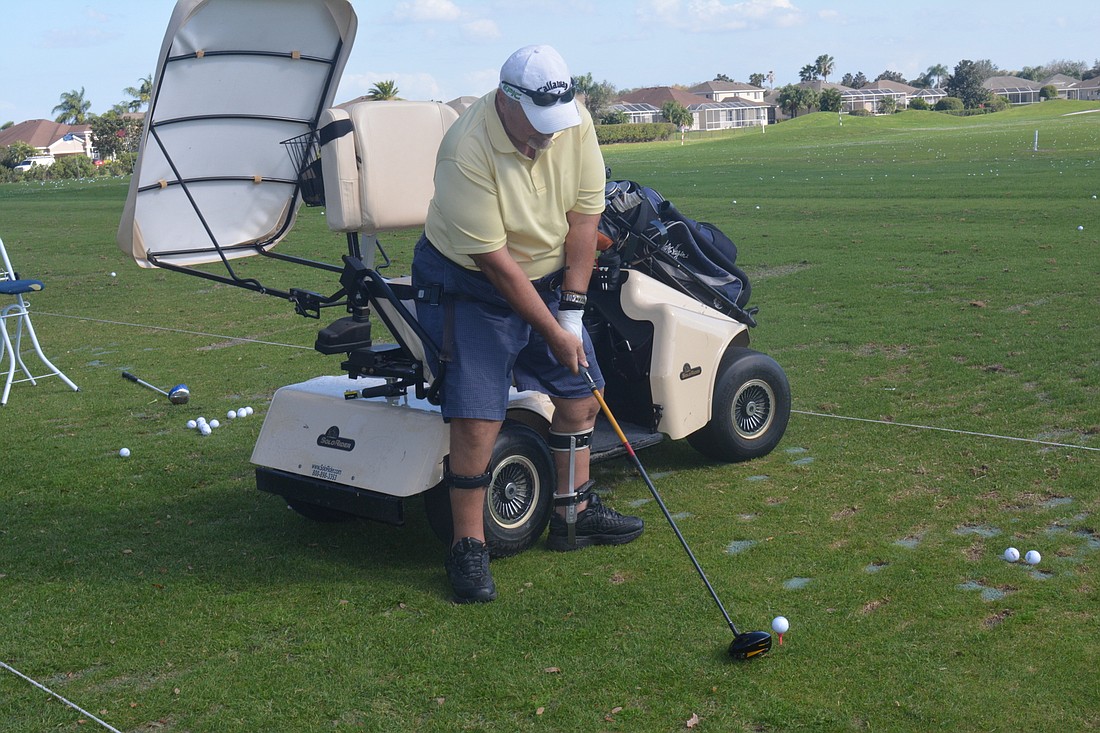- November 23, 2024
-
-
Loading

Loading

It has been more than 10 years since Walter Pawlowski was able to play golf without assistance.
He was a 7 handicap back then, he said, before he ruptured seven discs in his spine on Father’s Day in 2008. Pawlowski was initially paralyzed below the waist, but with time has regained some movement, though he walks with crutches and suffers from foot drop, making physical activity next to impossible.
Rather, for eight years, he thought it was impossible. Two years ago, Pawlowski began attending Adaptive Golf Sarasota, a chapter under the Adaptive Golf Association umbrella, held weekly at Tatum Ridge Golf Club. The program is a complementary community clinic designed for any individual with physical, cognitive or sensory impairments. These include strokes, joint replacements, limb loss, PTSD, and MS, among others, and is open to both adult and junior golfers.
It came to Tatum Ridge in 2008 thanks to David Windsor, the director of programs and development at the Adaptive Golf Association and a national coach/trainer. Windsor stayed with the Sarasota program — and helped other chapters of the program open on the Gulf Coast — until moving to Georgia in 2015 to develop programs in that state.
Pawlowski, 71, uses a special cart at the program called a SoloRider to help him play. The seat on the cart swivels around to provide support to golfers when swinging. The program also offers golfers things like “Believe-it boards,” which are placed under golf balls to lower resistance and ensure clean contact and help golfers with less power in their swings hit the ball farther.
“It helps me prove that I am still a great player,” Pawlowski said, laughing. “It is good to be getting physical again. It keep my game sharp. It is filled with nice people. I do it for the social stuff as much as the golf.”
Windsor, who still has family in Sarasota, was in town Feb. 21 to visit the program, doling out lessons while catching up with longtime participants. The program threw a pizza party afterwards, for golfers and family members. Windsor mingled with everyone like they were old friends, because in some cases, they were.
“This is a ministry for giving back,” Windsor said. “You can see the impact it has on people’s lives. We are all connected. Golf brings people together.”
Windsor said teaching an adaptive class is in some way similar to teaching a non-adaptive class, but the component is “real encouragement.” Whatever it takes for golfers to be able to play — SoloRiders, special gloves, etc. — will be done, and workarounds in a swing will be made, so a golfer’s strengths are highlighted, not any deficiencies.
Current program coach Doug Erb, who took over when Windsor left, said he sometimes enjoys the class more than the participants.
“We have had someone with almost every disability you can think of,” Erb said. “We come out here and have a ball. No matter who it is, if you hit a good shot, everybody knows about it immediately and starts cheering. Our whole deal is to get them out on the golf course again. A lot of these people, they were going to quit. They get here and say, ‘No, I don’t think I can do it.’ Three weeks later, they are a part of the program and using our SoloRiders to play, or they’re just being out in the sunshine again.
“I go home some nights just totally exhausted, and my wife (Sherry Erb) will say, ‘Let’s go to bed early.’ And I say, ‘I can’t, I’m still high (from the experience).’”
Chris Jay, another participant, has cerebral palsy. He splits his time between Sarasota and Southampton, England, and is the founder of Bascule Disability Training, a service that teaches businesses how to be more inclusive and open. Jay has been coming to the clinic since 2000, when it was still held at the now-closed Foxfire Golf Club, and is delighted by the program’s power of positivity.
“England is not as well set up for this kind of golf,” Jay said. “It is still a bit of a snobbish game still, there. There are tournaments and stuff for people with disabilities, but there is nowhere to learn. That is one of the things that makes this place so special.
“My first session here, I was a 15 year old kid. Probably had not accepted my disability to the same degree that you can when you are much older. It was — and I often tell kids this when I work in schools — it was about being shown what is possible. I am a crap golfer. I am always going to be a crap golfer. But that is OK, because if someone had told me before (that lesson) that I could play golf, I would have told them they were mad.”
The program continues to change the lives of its more than 30 participants, and is always encouraging new members to try it for themselves. A $20 access fee goes toward the program's equipment and instruction. Sessions are held Thursdays from 3-5 p.m. November-April and Wednesdays 9:30-11:30 a.m. May-October.